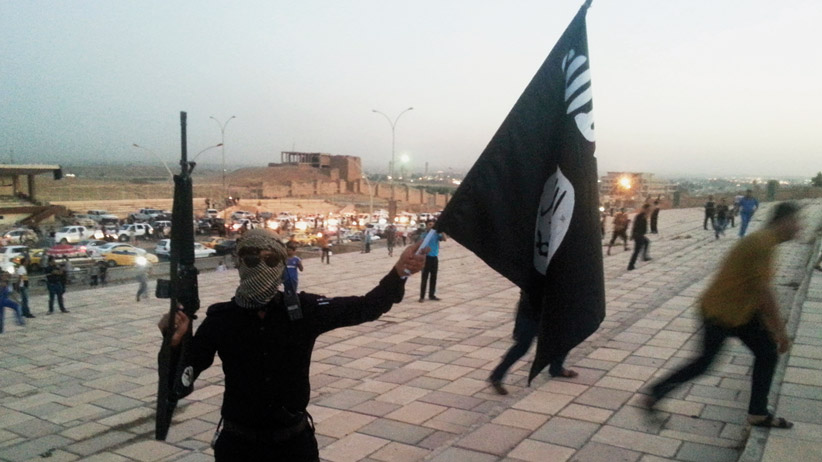Letters: “Why should it be our responsibility to destroy ISIS”
Maclean’s readers write their thoughts on our coverage in letters to the editor

A fighter of the Islamic State of Iraq and the Levant (ISIL) holds an ISIL flag and a weapon on a street in the city of Mosul, June 23, 2014. U.S. Secretary of State John Kerry held crisis talks with leaders of Iraq’s autonomous Kurdish region on Tuesday urging them to stand with Baghdad in the face of a Sunni insurgent onslaught that threatens to dismember the country. Picture taken June 23, 2014. REUTERS/Stringer (IRAQ – Tags: CIVIL UNREST POLITICS TPX IMAGES OF THE DAY) – RTR3VIB1
Share

The immigration balance
Whether a country has too many immigrants or not depends on the rate of their arrival, cultural differences, willingness and ability to integrate, and the social services available to immigrants without interfering with what existing residents receive (“The last lines of defence,” National, April 2017). The problem in some parts of the U.S. and Europe is that the flood of mostly illegal and poorly educated immigrants is more than the host societies can absorb. Canada is a prime example of a country where gradual immigration over decades helped develop it, particularly when the growing economy needed new workers. An influx at the same or higher rate, in a stagnant economy with services already under pressure, stresses the system, and citizens who are paying for it begin to resent the newcomers.
As a brown immigrant of ’70s vintage, I have noticed this change in Canada and to pretend otherwise is dangerous, to say the least.
Sudhir Jain, Calgary
Keeping peace
Reading your lead editorial, “More than just America’s foil” (March 2017), I got as far as the proclamation that our recent attack “finds us once again unwilling participants in a global war on intolerance.” Since when were we “unwilling”? Did we not join Uncle Sam in the hunt for Bin Laden in Afghanistan, the bombing in Syria to destroy ISIS, and now in the training of troops to engage in the same pursuit?
Canada did not create ISIS. So why in the world should it be our responsibility to destroy them? When Mr.Trudeau promised he would regain our status as a peacekeeping nation, I didn’t think he meant we should send our troops to other countries and train them to better kill their enemies. That’s not peacekeeping.
Rod Retzlaff, Castlegar, B.C.
Unlawful sanctuary
Your editorial was spot on (“Reckless sanctuary,” April 2017). City councils who order local police to disobey the law—is that legal? Should the councils of Toronto and Montreal be arrested by the RCMP? I support legal, points-based immigration. Illegal immigration is illegal. Period.
Paul James, Markham, Ont.
Populist provocation
Populist politicians may not be saints, but does that justify demonizing them? What they are doing is providing the vehicle for expressing the views of many people on important current issues, especially when those people do not have any other outlet. Or did we get so far with our current distorted view of “democracy” that any involvement of the “deplorables” is simply not welcome?
Josef Fikart, Port Moody, B.C.
After reading your article (“Populist goes the world,” National, April 2017), I felt like you danced around the core issue to make your narrative fit into your pigeonhole.
Is populism on the rise, worldwide? Yes! Is fear of, and anger at, foreigners on the rise? Absolutely! Your attempts to link the two as if one directly caused the other, ignore the real reasons for the mostly Western phenomenon. Populism is on the rise worldwide due to the failure of the neo-con/globalist economic experiment and the crony capitalism that accompanies it, period. Wealth inequality is at an all-time high, unions have been destroyed and livable wages are extremely hard to find. Add in the mass migrations of war and economic refugees and a mass media hell-bent on protecting a failing system, and you end up with Trump, Le Pen and Brexit.
The fear of, and anger at, foreigners is not the reason for the rise of populism. This is only another superficial excuse to cover for a failed economic model the ruling elite are not prepared to change.
Michal Sokolowski,
Moncton, N.B.
What’s in a name? Today’s populist exploiters are the fascists of the ’30s. I am reminded of the rhetoric of Oswald Mosley, et al.
David Owen, Canmore, Alta.
The last line of the article “Populist goes the world” extols our “carefully built house of peace, order and good government.” Mr. Gilmore oversells his case. My definition of good government is one that can change and modify democracy to better serve the good of all Canadians. Our democracy has many other problems we should be trying to address, like the concentration of power in the Prime Minister’s Office, large and continual deficits that compromise our ability to fund necessary social programs, an election format that allows a party with 30 to 40 per cent of the vote to rule with a majority and a system that increases wage disparity and reduces the middle class.
When a prime minister dismisses a campaign promise that would have improved our democracy, it’s no wonder there is increased dissatisfaction among Canadians. Unfortunately, it is the right-wing politicians that seem to represent that dissatisfaction, and governments in power cannot seem to make meaningful changes to improve our democracy.
Gary Lewis, Owen Sound, Ont.
I am a populist; I believe that people all have individual talents and limitations, but that each person is equally worthy and deserving of respect, especially before the law. You can discern a thread of common opinion among the real people (not the brainwashed elite); Preston Manning called it the “common sense of the common people,” and it now believes that the trend toward an all-powerful government, with attendant losses of privacy, property and freedom for ordinary people, has gone too far. It appears Maclean’s has defined “populism” as shorthand for “stupid, primitive, uninformed, following tribal urges.” I find that extremely offensive, disrespectful of the real people, profoundly anti-democratic and grotesquely elitist, but maybe less so if taken as a mere reaction to the coming death of that beloved “government-owns-all” trend.
Mel Fisher, Dryden, Ont.
Populism is a rising evil that seems to have beset us in recent times. When people meet with unwarranted rejection, when basic needs are not met and they reach their limit in tolerance, large ethnic groups may unite, catapulting their needs and views as the primary agenda of the party, in the face of other pressing issues. We can combat this and eliminate the fear factor by knowing our neighbour. Despite their differences, people are the same everywhere, with similar values and the same family and economic anxieties, and are more interested in home and hearth than in any kind of negative activity. People should stop and think before becoming pawns taken on a political ride.
Maria Jacob, Mississauga, Ont.
Questionable roles
After reading “The problem with men” (Society, April 2017), I am struck yet again by a routinely mistaken fundamental in this ever-present and evolving subject—equal is confused with identical. Thankfully, men and women are not identical anatomically, physiologically, temperamentally or psychologically. We are a magnificent complementarity of great potential value to ourselves, our children and the world. Eliminate the abuse, not the difference! It is naive and futile to defy nature by arbitrarily imposing identical roles in parenthood, marriage or the world in order to be equal. We are equal and different. It is a partnership that can function wholesomely without trying to change the differing roles and their respective strengths.
Dr. Howard Taynen,
Ancaster, Ont.
Some people haven’t noticed that it isn’t just males, with Trump as paradigm case, who have become cruder. Women have joined the club, perhaps as a reaction to the traditional, narrow, Madonna-like model of what is feminine thrust upon women through social engineering. Thanks in large part to the LGBTQ community, time and inevitable inertia, the male-female dichotomy is becoming blurred. We need to concentrate on what it is to be human, and sex/gender have little if anything to do with it.
Doris Wrench Eisler, St. Albert, Alta.
Food for thought
Shame on you for referring to American TV host Guy Fieri as “the fat guy” (“Stuck in the Craw,” April 2017). Aren’t we supposed to refrain from referring to personal appearances in a denigrating way? And Canadian chef Eric Gonzalez, pictured in the article, is definitely a plus-sized man. You didn’t refer to him as “the fat guy.” Show everyone, from whatever country, the same respect, please.
Megan Saben, Chemainus, B.C.
The gymnastics of Canada 150
Your discussion of Charlottetown and New Brunswick as Canada’s birthplace was most interesting (“Confederation smackdown!” April 2017). For either place to be regarded as Canada’s birthplace requires an exercise in mental gymnastics because the birth of Canada took place July 1,1867, as spelled out in the British North America Act. Prince Edward Island was not even party to the birth, as she had withdrawn from implementation of Confederation in early 1865. She joined Canada some time later, in 1873, against the wishes of her fervently anti-confederate population, when forced by the imperial government to go to John A. Macdonald for financial aid, following the island’s railway construction fiasco.
In terms of who did what in the discussions leading up to Confederation, the prime movers were clearly John A. Macdonald and George Étienne Cartier, with the support of the British government. As you point out, New Brunswickers themselves were less than enthusiastic and Nova Scotians actually voted to leave Confederation in September 1867, but were forced to stay in Canada by Her Imperial Government.
The 1864 Charlottetown Conference was a major event in the establishment of Canada, though the role of Islanders at that event was modest, to say the least. Its importance was well recognised in the celebrations of 2014. But it can hardly be viewed as Canada’s birthplace, notwithstanding the efforts of P.E.I.’s politicians to proclaim it as such, unless Canadians are prepared to accept that Canada’s true date of birth was Sept. 1, 1864. And what date do our New Brunswick friends have in mind?
John Palmer, West Covehead, P.E.I.
Piercing observation
Karina Gould is to be admired for her intelligence, academic achievements and devotion to humanitarian causes, so I am disappointed and dismayed that Maclean’s has chosen to print a photo of her putting on her earrings in front of the mirror (“The Big Picture,” March 2017). Had the youngest minister in our cabinet been male, would he have been portrayed putting on his tie?
Frances Perelle,
North Vancouver, B.C.
Russian diversion
It is obvious that Allen Abel wrote this article from within Russia (“Return of the Czar,” April 2017). The Russian people thrive on political discussion, but Maclean’s does not appear to grasp this. Why would Putin want Trump in the White House when he had such an easy time bullying the previous occupant?
Your implication that Putin interfered with the American election process is just wrong. Now Americans have some hope for the future with a president who is doing his damnedest—against tremendous odds, with the left, the media and the Democrats bucking his every move, even, gasp, making things up—to follow through on his campaign promises. What a breath of fresh air!
Susan A. Frandsen, Rockton, Ont.